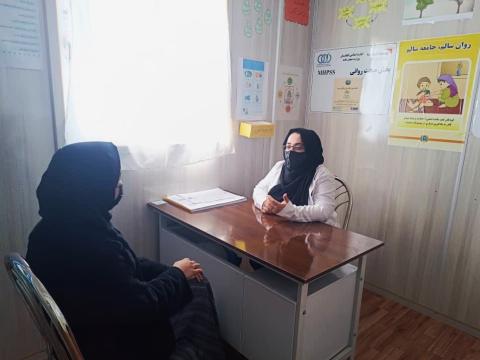Sanam’s Journey to Mental Health

In the quiet corners of a village, a young woman’s life was quietly unraveling under the heavy burden of emotional pain. 25-year-old *Sanam had recently moved away from her hometown following her marriage—a transition that should have marked a new beginning. Instead, it marked the start of profound psychological distress. Disconnected from her family and familiar support system, she was confronted by a cold and tense new reality. The serious illness of her brother, ongoing economic hardship, and persistent family conflicts compounded her suffering, leading to a silent yet overwhelming mental health crisis.
“I felt like I was drowning in a storm that no one could see,” Sanam recalls. “I was anxious all the time, angry at everything, and couldn’t find peace even in silence.”
When Sanam first entered the counseling room at the Organisation for Community Coordination and Development (OCCD) Health Facility, she appeared physically and emotionally exhausted—her voice fragile, her eyes dim, and her words heavy with unspoken sorrow. She reported chronic fatigue, intense headaches, muscle weakness, palpitations, trembling, irritability, persistent worry, and a sense of helplessness that clouded every part of her daily life. Loud sounds triggered bursts of anger, and she had withdrawn into herself, overwhelmed by the weight of a reality she could no longer cope with.
Beginning in January 2025, Sanam participated in eight structured counseling sessions through OCCD’s mental health support, under the German Federal Foreign Office (GFFO)-funded project. The counselor guided her through an integrative therapeutic process focused on psychological empowerment. From the first session, a secure space was established—one grounded in trust, confidentiality, and respect. Through Cognitive Behavioral Therapy (CBT), Sanam began identifying and challenging the distorted thoughts that had long shaped her suffering. She was taught anxiety-reduction techniques such as diaphragmatic breathing, progressive muscle relaxation, and mental imagery to help her find relief in moments of panic.
Step by step, her coping mechanisms were reinforced or rebuilt. She learned problem-solving and decision-making strategies, practised mindfulness to quieten intrusive thoughts, and used emotional journaling as a tool to reflect and self-monitor. Anger management training helped her regain control of her emotional responses, and exercises to enhance her confidence and rebuild her self-worth slowly restored the parts of her identity that had faded.
“The sessions gave me space to breathe again. For the first time, I felt heard and understood without judgment,” she shared.
By the end of her counseling journey, Sanam had transformed into a grounded, self-aware, and emotionally balanced woman. Anxiety gave way to calm, helplessness turned into resilience, and her capacity to manage life’s challenges returned. Her thoughts became clearer, her emotional regulation more stable, and her self-image brighter. Her words reflected this change not only in gratitude but in strength.
“I’m no longer that broken person,” she says with calm certainty. “Thanks to the counselors and the team at the clinic, I now feel capable. I can face life’s challenges without falling apart.”
With heartfelt appreciation, Sanam expressed her thanks to the health facility team, and OCCD for their dedication and care.
“I want to thank the clinic, and the OCCD organisation. Your service is not only professional—it’s life-changing. What you gave me can’t be measured in words.”
Sanam’s journey is a powerful testament to the transformative power of mental health support when delivered with compassion, skill, and consistency. Her recovery reminds us that psychological counseling is not just treatment—it is a path back to oneself.
Through the efforts of OCCD under the GFFO project, women like Sara are not only healing—they are thriving, with dignity, awareness, and hope restored.
*Name has been changed to protect identity.